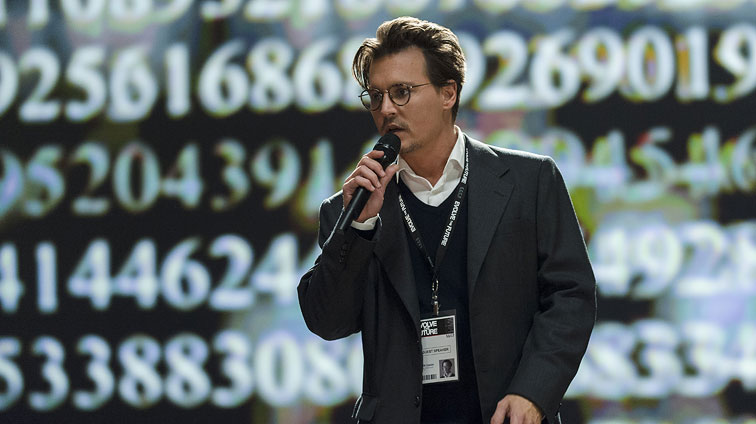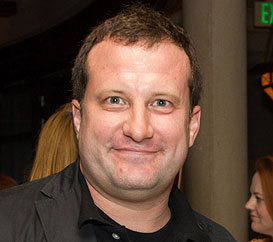
Finding Transcendence
Jack Paglen channels an actor’s tool set into a story about Artificial Intelligence.
 Janice Ogata/PRPhotos.com
Jack Paglen
Janice Ogata/PRPhotos.com
Jack Paglen
The actor’s craft of identifying goals, conflict, and tactic are really useful to the writer. It’s the tool set I use now when I write.
Transcendence, boasting a heady stew of philosophical, metaphysical, and technological queries not often seen in big-budget science-fiction films, features Johnny Depp as Dr. Will Caster, a computer maverick working at the vanguard of consciousness and able to defy death by becoming one with technology. The film marks the feature debut of screenwriter Jack Paglen and is directed by Wally Pfister (longtime cinematographer for Christopher Nolan). Soft-spoken, quick to laugh, and perpetually curious, Paglen cut his teeth penning plays, acting in regional theater and short films, toiling away on unproduced black comedies, and keeping an unimaginably low profile for a Hollywood comer. Now—on the strength of the Blacklisted Transcendence—he’s one of Tinseltown’s in-demand sci-fi scribes, having just wrapped work on Prometheus 2 for Ridley Scott and recently drafted to reinvent Battlestar Galactica as a feature franchise for Universal. Paglen admits he’s enjoying “playing in this almost unbelievable sandbox,” but that his life remains largely unchanged. He’s still learning all the time, ever attempting to improve his craft. The key, Paglen believes, is to keep asking questions.
Like the best sci-fi, Transcendence is only about five-seconds from being a reality.
Yeah. This movie is set next Thursday. (Laughs)
But it’s been gestating for a long time.
My wife is a computer scientist, and I have had, all the way back to when she was in college, the privilege of hanging out with her and her incredibly intelligent friends. When she was at NYU, she was paying her way through college by working on the Natural Language Processor, which is a kind of Artificial Intelligence. She interfaced with neurologists, both wet and dry, and we spent a lot of time talking about consciousness and computer capability and the exponential growth of technology and progress, and the idea that at some point computers would be capable of the intelligence of mankind. One of the ways a computer might wake up to consciousness is by having an individual upload their consciousness into a machine. This idea of mind uploading had been floating around in my head for a long time.
Along with that sci-fi hook, Transcendence is a potent love story. Was that love story always the core for you?
It was always my intention. For a long time, I wanted to write a movie about the first guy to upload his consciousness into a machine, but the idea of transcendence—or The Singularity—is a conceptual thing. I wanted to find some way for the audience to relate to it. Inspired by my own marriage, I started wondering what would happen if my wife, knock on wood, was in a mortal situation and what lengths would I go to save her. I felt that was an interesting question that audiences might find relatable. Conceptually, I knew I had something great, but a great movie also needs to have real human feeling. How far would you go to save the one you love? That’s a dramatic question we can all relate to.
There is a lot of hard science in Transcendence, but guys like Arthur C. Clarke and Robert Heinlein are not quite so romantic.
(Laughs) Those guys are major inspirations for me, for sure. Arthur C. Clarke’s law— “any sufficiently advanced technology is indistinguishable from magic” — is certainly a touchstone and inspiration in the drafting of Transcendence. And once Will is uploaded into the machine, he starts being capable of these miracles. Those guys write very different science fiction from Transcendence, but I love their work.
How does Transcendence go from an idea kicking around in your head to what audiences are now seeing on the silver screen?
(Producer) Anne Marter called me up one day—we’d been friends forever—and she asked if I’d ever heard of this idea called The Singularity. In fact, I had! (Laughs) We immediately found a mutual passion for the concept and quickly broke what became this story. We worked closely together building the pitch for it, and we pitched it to Straight Up Films. It was my first pitch, and they bought it. I couldn’t believe my luck. It was also my first science-fiction script. Before that, I’d mostly written plays and these independent-minded, dark-comedy screenplays. Straight Up got the script to Wally Pfister, and Wally called me up and said he wanted to direct it. I couldn’t believe it. Wally Pfister had been instrumental in making, literally, some of my favorite movies. It just went from there. That was a very, very good week.
How did your life change at that point?
It was a big deal for me, but thank goodness my wife is such an anchor. I told her the news, and she asked me what I wanted to do to celebrate. So we went out to the movies, which is probably my favorite thing in the world to do. I don’t even remember what we saw.
Transcendence poses a lot of spiritual and metaphysical questions. I’m wondering what those things mean to you?
Well, my mother is an Episcopal priest. Although I, myself, am agnostic, I definitely looked at this movie and saw this being performing these technological miracles. I was certainly drawn to look at the last time a being came to Earth and started performing these kinds of miracles and how the world responded to it. What do you do if someone can suddenly heal sick people and bring the dead back to life? So if this future that the experts believe will happen—it’s only a question of when—how will the world respond and how will we keep our humanity in the face of something so inhuman? These are familiar questions to a lot of us. Especially my mom. (Laughs)
There is a certain contemplativeness I’m sensing in you, which might confirm something I read online: You once played Hamlet onstage.
Hamlet is my favorite play, and playing Hamlet in this little regional theater in Knoxville, Tennessee, had a deep affect on me personally and artistically. I just can’t even believe that play exists; it’s just sheer brilliance. Doing that part taught me something profound about writing drama, at least for me, which is: The actor’s craft of identifying goals, conflict, and tactic are really useful to the writer. It’s the tool set I use now when I write. Dialogue is just a tactic for characters to get what they want, right? In Transcendence, there’s a lot of intellectual banter between the characters, but I tried to make sure that it was tactic, not exposition.
When did you know you wanted to be a writer?
Ever since I was a kid, I was always writing something. I started writing short stories in high school and started writing plays in college. My graduate project in college was a play that I produced and mounted with my friends. Writing has always been an instrumental part of my life and a way to express myself. The more and more I wrote plays, the more cinematic they became. My love of cinema won out. I went and got a second MFA at Columbia University in film and concentrated on screenwriting.
You actually taught screenwriting at NY Film Academy, right?
Yeah, I was teaching when I sold the pitch to Transcendence. I was sworn to secrecy about the project and Wally’s involvement and Christopher Nolan’s involvement. Privately, I was holding this enormous secret from my students, and it was hard because we were discussing the films that Christopher and Wally made together in my class! It was hilarious. When the movie was finally announced, my students were very, very kind to me and bought me a cake, and it was really cool. But I learned so much about how to be a better writer by helping other people become better writers. I miss teaching. I’ve just had my hands full.
What’s the most important lesson you taught or learned?
I still consider myself a student, for sure, and an up-and-coming screenwriter, so I don’t want to sound presumptuous. But one of the most important things you can do as a writer, and this is an acting technique too, is: Play the “Magic If.” If I were this character in these circumstances, what would I do? That’s a helpful resource. It allows me to stop thinking about my story as a cartographer, from a bird’s-eye view, and starting feeling my story from the POV of my characters. There’s certainly the time when you’re developing your story and you’re using index cards and plotting it all out—the cartography, if you will. But when you’re in the writing, after accumulating a certain critical mass, it’s essential to start playing the “Magic If.” That’s when the characters start to sing for me.
So life is a little different than it was two years ago?
My professional life is, but my private life is similar. My wife is not in the entertainment business, and she’s very grounded, and that’s wonderful. Things haven’t changed so much, and wherever you go, there you are. I’m still the same guy, and that’s important for the work. You’ve got to keep all of this in perspective.
© 2014 Writers Guild of America West
